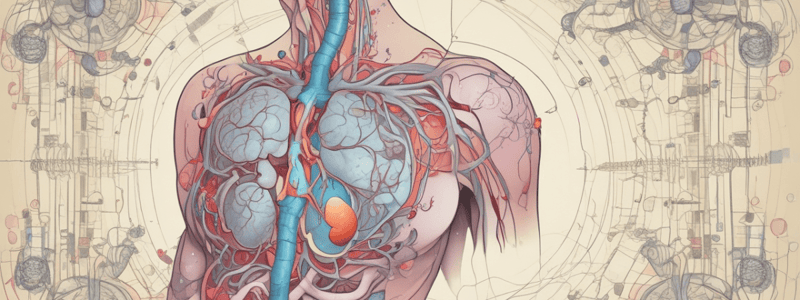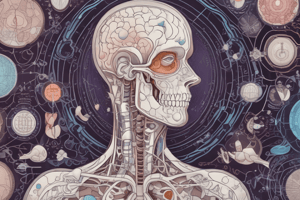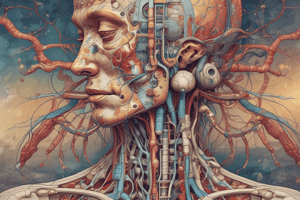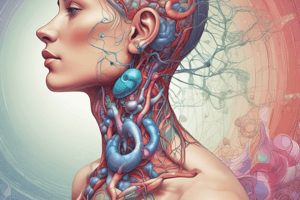Podcast
Questions and Answers
What is the term for a condition in which the adrenal glands do not produce enough cortisol?
What is the term for a condition in which the adrenal glands do not produce enough cortisol?
- Cushing syndrome
- Hyperthyroidism
- Addison disease (correct)
- Graves' disease
Which hormone is responsible for regulating the amount of water in the body?
Which hormone is responsible for regulating the amount of water in the body?
- Thyroid-stimulating hormone
- Antidiuretic hormone (correct)
- Adrenocorticotropic hormone
- Aldosterone
What is the term for a condition in which the thyroid gland produces too much thyroxine, leading to symptoms such as weight loss and anxiety?
What is the term for a condition in which the thyroid gland produces too much thyroxine, leading to symptoms such as weight loss and anxiety?
- Hypothyroidism
- Addison disease
- Cushing syndrome
- Hyperthyroidism (correct)
What is the term for the system in which the hypothalamus, pituitary gland, and adrenal glands work together to regulate hormone production?
What is the term for the system in which the hypothalamus, pituitary gland, and adrenal glands work together to regulate hormone production?
What is the term for the hormone produced by the adrenal medulla that is involved in the 'fight or flight' response?
What is the term for the hormone produced by the adrenal medulla that is involved in the 'fight or flight' response?
What is the term for a tumor of the adrenal medulla that can cause high blood pressure and other symptoms?
What is the term for a tumor of the adrenal medulla that can cause high blood pressure and other symptoms?
What is the term for the hormone produced by the pituitary gland that stimulates the adrenal glands to produce cortisol?
What is the term for the hormone produced by the pituitary gland that stimulates the adrenal glands to produce cortisol?
What is the term for a condition in which the thyroid gland produces too little thyroxine, leading to symptoms such as fatigue and weight gain?
What is the term for a condition in which the thyroid gland produces too little thyroxine, leading to symptoms such as fatigue and weight gain?
Which hormone is involved in the regulation of electrolyte and water balance in the body?
Which hormone is involved in the regulation of electrolyte and water balance in the body?
What is the term for a tumor of the adrenal gland that can cause high blood pressure and other symptoms?
What is the term for a tumor of the adrenal gland that can cause high blood pressure and other symptoms?
What is the term for the system in which the hypothalamus, pituitary gland, and thyroid gland work together to regulate hormone production?
What is the term for the system in which the hypothalamus, pituitary gland, and thyroid gland work together to regulate hormone production?
What is the term for a condition in which the adrenal glands produce too much cortisol, leading to symptoms such as weight gain and hypertension?
What is the term for a condition in which the adrenal glands produce too much cortisol, leading to symptoms such as weight gain and hypertension?
Which of the following is a symptom of hypothyroidism?
Which of the following is a symptom of hypothyroidism?
What is the term for the hormone produced by the thyroid gland that plays a role in regulating metabolism?
What is the term for the hormone produced by the thyroid gland that plays a role in regulating metabolism?
What is the term for a condition in which the adrenal glands do not produce enough aldosterone, leading to symptoms such as dehydration and electrolyte imbalance?
What is the term for a condition in which the adrenal glands do not produce enough aldosterone, leading to symptoms such as dehydration and electrolyte imbalance?
Flashcards are hidden until you start studying
Study Notes
Endocrine System Vocabulary
- Primary endocrine disorders occur when there is a problem with the endocrine gland itself, whereas secondary endocrine disorders occur when there is a problem with the pituitary gland or hypothalamus.
- Radioactive iodine therapy is a treatment for thyroid disorders.
- ACTH (adrenocorticotropic hormone) regulates the production of cortisol by the adrenal glands.
- "Steroid dependent" refers to a condition where the body is dependent on steroids to function normally.
- Addisonian crisis, also known as acute adrenal crisis, is a life-threatening medical emergency that occurs when the adrenal glands do not produce enough cortisol.
- Striae are stretch marks that occur due to excessive cortisol production.
- Subclavicular fat pad, also known as "buffalo hump", is a condition characterized by excessive fat accumulation in the upper back.
- Thyrocalcitonin is a hormone that regulates calcium levels in the blood.
- Thyroid storm, also known as thyroid crisis, is a life-threatening condition that occurs when the thyroid gland produces too much thyroxine.
Adrenal Glands
- Addison disease, also known as primary adrenal insufficiency, is a condition where the adrenal glands do not produce enough cortisol and aldosterone.
- Adrenal cortex produces glucocorticoids and mineralocorticoids, while adrenal medulla produces catecholamines.
- Aldosterone regulates electrolyte and water balance in the body.
- Androgen is a hormone that regulates male characteristics.
- Antithyroid medication is used to treat hyperthyroidism.
Thyroid Gland
- Thyroidectomy is a surgical procedure to remove the thyroid gland.
- Thyroxine (T4) and triiodothyronine (T3) are hormones produced by the thyroid gland.
- TSH (thyroid-stimulating hormone) regulates the production of T4 and T3.
- Virilization syndrome is a condition characterized by the development of male characteristics in females.
- Vitiligo is a condition characterized by the loss of skin pigment.
Other Endocrine Concepts
- Congenital adrenal hyperplasia (CAH) is a genetic disorder that affects the adrenal glands.
- Conn syndrome, also known as primary hyperaldosteronism, is a condition where the adrenal glands produce too much aldosterone.
- Corticosteroids are hormones that regulate inflammation and immune response.
- Cushing syndrome is a condition characterized by excessive cortisol production.
- Epinephrine, also known as adrenaline, is a hormone that regulates the "fight or flight" response.
- Euthyroid refers to a state of normal thyroid function.
- Exophthalmos is a condition characterized by bulging eyes.
- Glucocorticoids regulate glucose metabolism and immune response.
- Goiter is a condition characterized by enlargement of the thyroid gland.
- Graves' disease is an autoimmune disorder that causes hyperthyroidism.
- Hashimoto thyroiditis is an autoimmune disorder that causes hypothyroidism.
- Hypothalamic-pituitary-target cell system is a complex system that regulates hormone production.
- Hypothalamus regulates body temperature, hunger, and thirst.
- Hypothyroidism is a condition characterized by inadequate thyroid hormone production.
- Mineralocorticoids regulate electrolyte and water balance in the body.
- "Moon face" is a condition characterized by round, puffy face due to excessive cortisol production.
- MSH (melanocyte-stimulating hormone) regulates skin pigmentation.
- Myxedema is a condition characterized by dry, rough skin due to inadequate thyroid hormone production.
- Myxedema coma is a life-threatening condition that occurs when the body does not produce enough thyroid hormone.
- Negative feedback mechanism is a process where the production of a hormone is regulated by its own levels.
- Pheochromocytoma is a tumor that produces excessive catecholamines.
- Pituitary gland regulates hormone production in the body.
- Polydipsia is a condition characterized by excessive thirst, while polyuria is a condition characterized by excessive urination.
Endocrine System Vocabulary
- Primary endocrine disorders occur when there is a problem with the endocrine gland itself, whereas secondary endocrine disorders occur when there is a problem with the pituitary gland or hypothalamus.
- Radioactive iodine therapy is a treatment for thyroid disorders.
- ACTH (adrenocorticotropic hormone) regulates the production of cortisol by the adrenal glands.
- "Steroid dependent" refers to a condition where the body is dependent on steroids to function normally.
- Addisonian crisis, also known as acute adrenal crisis, is a life-threatening medical emergency that occurs when the adrenal glands do not produce enough cortisol.
- Striae are stretch marks that occur due to excessive cortisol production.
- Subclavicular fat pad, also known as "buffalo hump", is a condition characterized by excessive fat accumulation in the upper back.
- Thyrocalcitonin is a hormone that regulates calcium levels in the blood.
- Thyroid storm, also known as thyroid crisis, is a life-threatening condition that occurs when the thyroid gland produces too much thyroxine.
Adrenal Glands
- Addison disease, also known as primary adrenal insufficiency, is a condition where the adrenal glands do not produce enough cortisol and aldosterone.
- Adrenal cortex produces glucocorticoids and mineralocorticoids, while adrenal medulla produces catecholamines.
- Aldosterone regulates electrolyte and water balance in the body.
- Androgen is a hormone that regulates male characteristics.
- Antithyroid medication is used to treat hyperthyroidism.
Thyroid Gland
- Thyroidectomy is a surgical procedure to remove the thyroid gland.
- Thyroxine (T4) and triiodothyronine (T3) are hormones produced by the thyroid gland.
- TSH (thyroid-stimulating hormone) regulates the production of T4 and T3.
- Virilization syndrome is a condition characterized by the development of male characteristics in females.
- Vitiligo is a condition characterized by the loss of skin pigment.
Other Endocrine Concepts
- Congenital adrenal hyperplasia (CAH) is a genetic disorder that affects the adrenal glands.
- Conn syndrome, also known as primary hyperaldosteronism, is a condition where the adrenal glands produce too much aldosterone.
- Corticosteroids are hormones that regulate inflammation and immune response.
- Cushing syndrome is a condition characterized by excessive cortisol production.
- Epinephrine, also known as adrenaline, is a hormone that regulates the "fight or flight" response.
- Euthyroid refers to a state of normal thyroid function.
- Exophthalmos is a condition characterized by bulging eyes.
- Glucocorticoids regulate glucose metabolism and immune response.
- Goiter is a condition characterized by enlargement of the thyroid gland.
- Graves' disease is an autoimmune disorder that causes hyperthyroidism.
- Hashimoto thyroiditis is an autoimmune disorder that causes hypothyroidism.
- Hypothalamic-pituitary-target cell system is a complex system that regulates hormone production.
- Hypothalamus regulates body temperature, hunger, and thirst.
- Hypothyroidism is a condition characterized by inadequate thyroid hormone production.
- Mineralocorticoids regulate electrolyte and water balance in the body.
- "Moon face" is a condition characterized by round, puffy face due to excessive cortisol production.
- MSH (melanocyte-stimulating hormone) regulates skin pigmentation.
- Myxedema is a condition characterized by dry, rough skin due to inadequate thyroid hormone production.
- Myxedema coma is a life-threatening condition that occurs when the body does not produce enough thyroid hormone.
- Negative feedback mechanism is a process where the production of a hormone is regulated by its own levels.
- Pheochromocytoma is a tumor that produces excessive catecholamines.
- Pituitary gland regulates hormone production in the body.
- Polydipsia is a condition characterized by excessive thirst, while polyuria is a condition characterized by excessive urination.
Studying That Suits You
Use AI to generate personalized quizzes and flashcards to suit your learning preferences.




